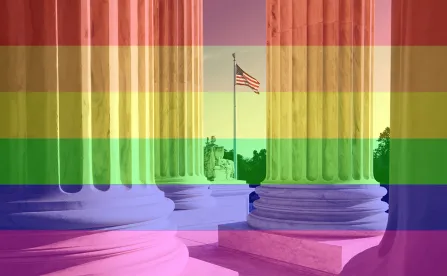On June 15, 2020, the Supreme Court issued a long-awaited opinion answering a hotly debated question: does Title VII of the Civil Rights Act of 1964 prohibit employers from discriminating against employees on the basis of sexual orientation or gender identity/expression? The Court answered in the affirmative, holding that Title VII’s prohibition on sex discrimination means that an employer cannot discriminate on the basis of sexual orientation or gender identity/expression.
For employers in New York and New Jersey, where state and local anti-discrimination laws already expressly prohibit discrimination on these bases, the Court’s decision is not as momentous as it is in the numerous states and localities without protections for gay, lesbian, and transgender employees. Still, New York and New Jersey employers are likely to see some effects and should be mindful of the Court’s decision as it may have implications on the Court’s interpretation of Title VII on other grounds.
Background
The Court’s opinion, Bostock v. Clayton County, Georgia, addressed three consolidated cases: one from Georgia where a county fired a public employee after he joined a gay softball league; one from New York where a skydiving school fired an instructor after he mentioned that he was gay; and one from Michigan where a funeral home fired an employee who presented as a male when hired but later announced her intention to live and work as a woman. Each employer conceded that they terminated their respective employee for being gay, lesbian, or transgender.
Lower federal courts were split on the legality of the terminations. One appellate court permitted an employee’s case to be dismissed, finding that Title VII does not prohibit employers from firing employees for being gay; the other two appeals courts permitted the cases to proceed.
The Court’s Opinion
Justice Neil Gorsuch authored the Court’s opinion, which boils down to the recognition that “it is impossible to discriminate against a person for being homosexual or transgender without discriminating against that individual based on sex.” In other words, “[s]ex plays a necessary and undisguisable role in the decision, exactly what Title VII forbids.” Thus, discrimination on the basis of sexual orientation or gender identity/expression is discrimination on the basis of sex. This is consistent with prior decisions recognizing that discrimination that considers sex among other reasons violates Title VII, such as discriminatory policies based on motherhood. Moreover, Justice Gorsuch wrote, an individual’s sexual orientation or gender identity/expression “is not relevant to employment decisions.”
The fact that a policy impacts gay, lesbian, or transgender employees of all sexes equally is irrelevant. The Court used the example of two employees, one male and one female, who are each attracted to men. An employer policy discriminating against gay or lesbian employees of all sexes would negatively impact the male and not the female, resulting in discrimination on the basis of sex. Similarly, if an employer favors a born-female employee over a transgender female employee, that employer is discriminating on the basis of sex.
In addition to its core holding, the Court’s opinion is important for two of its themes. First, the Court recognized that the drafters of Title VII likely did not anticipate the result in Bostock. “But,” as Justice Gorsuch wrote, “the limits of the drafters’ imagination supply no reason to ignore the law’s demands.” In other words, the language of Title VII should not be limited to the original intentions of the drafters. This leaves the door open to further expansion of federal anti-discrimination law. Second, the Court emphasized a key rule for Title VII and similar laws: discrimination based on a protected characteristic need not be the sole or primary basis underlying a decision for that decision to be illegal. The Court stated that it is unimportant if another, non-protected trait is a significant factor in an adverse employment action.
In addition to Justice Gorsuch (who was nominated to the Court by President Donald Trump), Chief Justice Roberts, and Justices Ginsburg, Breyer, and Kagan joined in holding that the terminations violated federal law. Justices Thomas, Alito, and Kavanaugh dissented, arguing principally that the Court was legislating an expansion of Title VII.
Key Takeaways
For employers in New York, New Jersey, and a number of other states and localities, state and local laws have long prohibited them from discriminating on the basis of sexual orientation or gender identity/expression. Where those employers will likely see a difference is in enforcement by the federal U.S. Equal Employment Opportunity Commission (“EEOC”), increasing resort by plaintiffs to agency adjudication through the EEOC, and increased legal filings in federal, rather than state, court. Given the procedural hurdles for pursuing Title VII claims, plaintiffs may nonetheless stick primarily with state and local claims. Certainly, the biggest difference will be seen by employers with employees in states and localities (e.g., Texas) without legal protections covering sexual orientation or gender identity/expression discrimination.
Employers can also expect to see increasing attempts by plaintiffs to bring additional protected characteristics within the scope of Title VII given the Court’s broad reading of the law and unshackling of the law from the drafters’ intentions.




 />i
/>i
